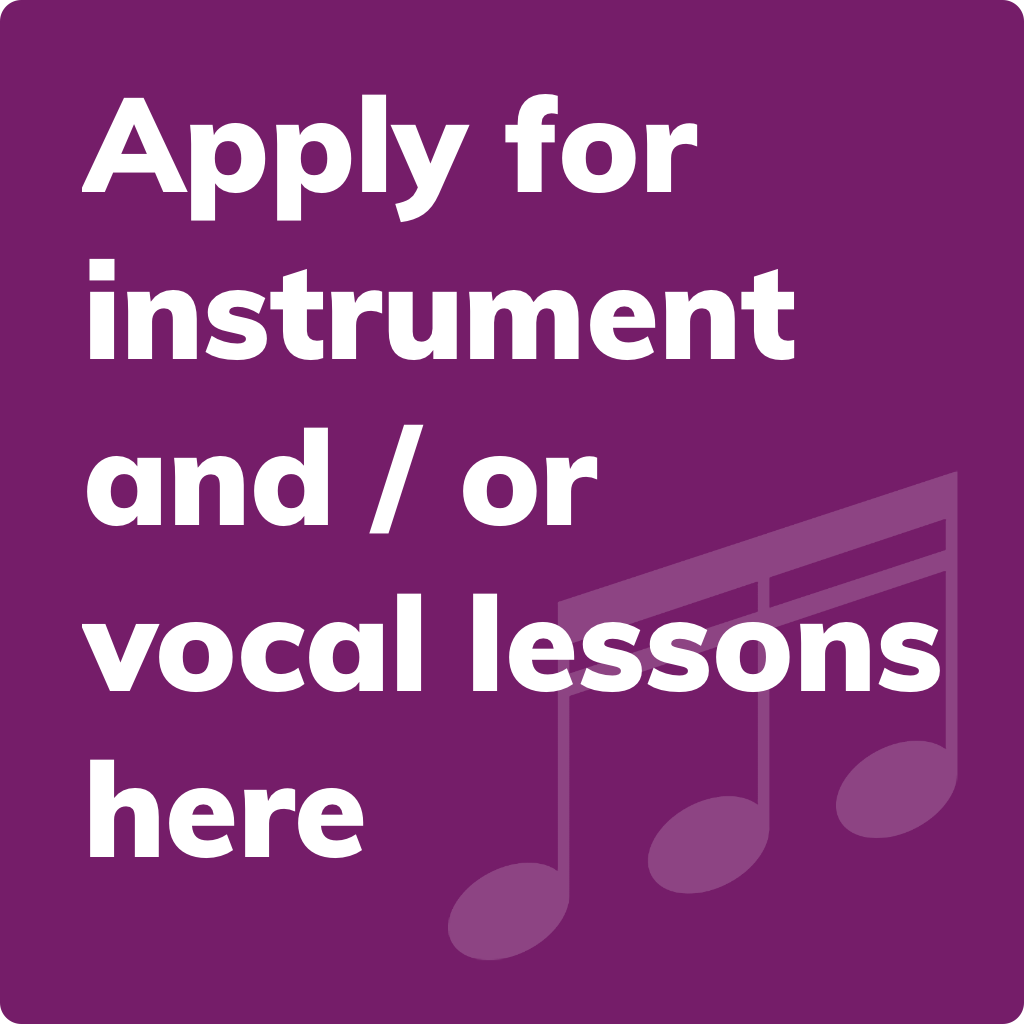We are fortunate to have a number of visiting teachers coming to Hall Mead with specialist skills and can therefore offer instrumental tuition on a wide range of instruments as well as singing lessons and group music theory lessons for students who wish to progress through the music grades.
If a child has a particular interest or aptitude for wanting to learn an instrument not immediately available at Hall Mead, we will do our best to organise a teacher!
We do encourage children to consider orchestral instruments as their first study enabling them to play in ensembles and groups. It is also important that we share with parents the inherent complex nature of the piano, which uses the two staves of music and ask them to carefully consider this particular instrument.
During the course of a typical term there are normally about 11 lessons. Each pupil receives an individual lesson and parents are able to select the lesson length from either 20 minutes, 30 minutes or 40 minutes lessons. Lessons are charged at £30/h pro rata.
The music lessons work alongside the academic timetable and rotate throughout the term. In special circumstances, music lessons can be extended in time for senior musicians working towards higher grades.
After each lesson, parents are sent an email confirming their child’s attendance and giving information on what their child should be practicing during the week.
We do expect children to practise regularly and encourage them to work on the basis of little and often and make our practice rooms available at lunchtimes and before and after school. All the instrumental teachers recognise that the children have a full and demanding day. It is about supporting, prioritising and perfecting the best use of practice time. The quality of proactive time is more important than the length.
We have a number of school instruments that students can borrow. This gives students the chance to really understand whether this is the correct choice of instrument before sourcing their own.
When parents decide to purchase an instrument which we really encourage in the long term, the instrumental teachers are always happy to advise and help make the most suitable and reasonable choices. Please be aware that musical instruments for music tuition can be purchased VAT free, via the school, using the government’s assisted instrument purchase scheme
Why Learn a Musical Instrument?
Because playing music enriches you! …………. but new research suggests that regularly playing an instrument changes the shape and power of the brain and may be used in therapy to improve cognitive skills. It can even increase IQ by seven points in both children and adults, according to researchers.
Experts said there is growing evidence that musicians have structurally and functionally different brains compared with non-musicians – in particular, the areas of the brain used in processing and playing music. These parts of the brain that control motor skills, hearing, storing audio information and memory become larger and more active when a person learns how to play an instrument and can apparently improve day to day actions such as being alert, planning and emotional perception.
Lutz Jäncke, a psychologist at the University of Zurich, said: “Learning to play a musical instrument has definite benefits and can increase IQ by seven points, in both children and adults. “The parts of the brain that control hearing, memory, and the part that controls the hands among others, all become more active. Essentially the architecture of the brain changes. “For children especially we found that learning to play the piano for instance teaches them to be more self-disciplined, more attentive and better at planning. All of these things are very important for academic performance, so can therefore make a child brighter.
Mr Jäncke also said that “If music has such a strong influence on brain plasticity this raises the question of whether this effect can be used to enhance cognitive performance. “Several studies indeed show that musical practice increases memory and language skills, and I suggest expanding this field. “Hopefully, the current trend in the use of musicians as a model for brain plasticity will continue … and extend to the field of neuropsychological rehabilitation.” The research is published in the online publication Faculty of 1000 Biology Reports.
Extract from Playing a musical instrument makes you branier by Richard Alleyne (Daily Telegraph)
Singing Lessons at Hall Mead
Why Take Singing Lessons? Are They For Me?
- Everybody has a voice, so you don’t need to buy or hire an instrument!
- Everybody can learn to sing – all it takes is training from a good teacher and practise
- Singing makes you feel good and it’s a great way to express yourself
- It can help you with other skills such as drama, aural training and sight singing (reading music)
- It’s completely different to being in a choir or having group singing lessons at a theatre school – lessons are made to suit each individual
- You can learn to sing different styles of music
- You can develop performance skills and acting through song
- You can take grades in singing
- You can perform in termly student concerts (solos/duets/ensembles)
- You can learn to sing without damaging your voice
- You can improve your vocal quality, pitching (singing in tune), breath control, projection, vocal range, diction and much more!
Places for singing lessons are limited so please sign up ASAP. Lessons times rotate each week so as not to disrupt your class lessons. Lessons are weekly and are 20 minutes or 30 minutes in duration


